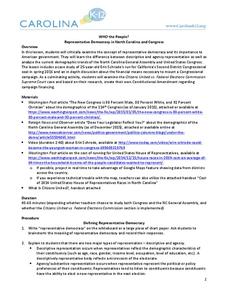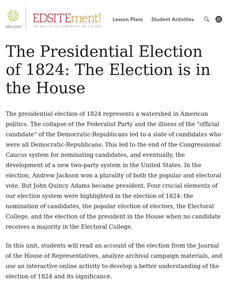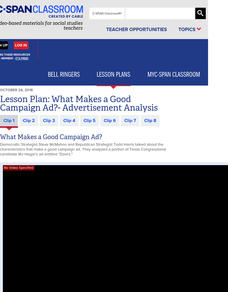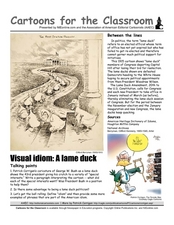Constitutional Rights Foundation
The Troubled Elections of 1796 and 1800
Congress does more than create new laws. Political scientists delve into the elections of 1796 and 1800 to understand how political parties, the Electoral College, and personal agendas affected the election process. The resource also...
Carolina K-12
Exploring the Electoral College
Does your vote really count? This activity helps young voters learn about the electoral college through a TED talk, a helpful handout, discussion prompts, and then a role-playing activity that has participants simulating an election on a...
Curated OER
Abraham Lincoln, the 1860 Election, and the Future of the American Union and Slavery
Students examine Abraham Lincoln's political views about slavery. In this American Civil War lesson, students determine how Lincoln's beliefs led to the restriction of slavery in American territories. Student also analyze the party...
Youth Leadership Initiative
Selecting a President: Primaries and Caucuses
What is a party caucus anyway? And what part do caucuses play in the primaries? Everything future voters need to know about the four stages in the presidential selection process is provided by this resource. The 2012 US Presidential...
Carolina K-12
Who the People? Representative Democracy in North Carolina and Congress
Our elected officials are supposed to represent us, but what does it mean when they aren't like us? Budding citizens explore the demographic makeup of the US Congress, the role of money in political elections, and the Citizens United...
Carolina K-12
The Electoral College
Put the Electoral College into perspective with a simulation of an election. Scholars experience an electoral vote, participate in an in-depth discussion on the topic, and engage in a congressional committee where they learn about the...
iCivics
Campaign Cash: Money Talks!
Money talks! And it can reveal a lot about political candidates. An 11-slide presentation examines how candidates raise and spend money on an election. The slides, using data from the 2016 Presidential election, reveal how much it costs...
Curated OER
The Election Is in the House: The Presidential Election of 1824
Students read an account of the election from the Journal of the House of Representatives, analyze archival campaign materials, and use an interactive online activity to develop a better understanding of the election of 1824 and its...
Curated OER
NONVOTING: CHAPTER 6: SECTION 4: WORKSHEET
It is interesting to look at the election and voting process from a far. This activity does just that, your class will look at trends in voting populations and develop an understanding of the voting process. Please note this resource...
Curated OER
The Organization of Political Parties
Challenge the future world leaders in your class with this activity, which tests their knowledge on the organization of modern political parties. Students can access their prior knowledge of current elections, or notes from your lecture,...
Curated OER
Race and Representation
Students consider race and representation. In this voting rights lesson plan, students listen to their instructor lecture on the Voting Rights Act of 1965, Georgia congressional districts, and North Carolina voting districts. Students...
Curated OER
Playing it Safe
Students explore the importance of an election and act as political advisers for an upcoming election. Students create platforms for various candidates, by writing a letter to their candidate with suggestions for winning the election.
Curated OER
The Election Is in the House: Was There a Corrupt Bargain?
Students take a stand, supported by evidence, on whether there was a "corrupt bargain" between Henry Clay and John Quincy Adams.
Curated OER
Lose a Vote, Gain a Vote
Students explore the issues behind close Senatorial races. They investigate the qualities of political leaders, the 2002 senatorial elections and the differences and similarities between the Republican and Democratic parties.
Curated OER
Shifting Wins
Students analyze how the outcome of the 2002 midterm elections changed the balance of power in the government. They write a news analysis and evaluation of how the nation be governed in the future.
Curated OER
Making Informed Decisions
Young scholars discuss various issues of importance in the 1998 congressional and gubernatorial elections, create comparison charts of their states' candidates' positions on these issues, and decide which candidate they would vote for...
Curated OER
Graphically Speaking
Students discover the links between population and Congressional representation. For this government lesson, students research population statistics and create spreadsheets that compare population to the number of Congress members per...
Middle Tennessee State University
Fights, Freedom, and Fraud: Voting Rights in the Reconstruction Era
As part of a study of post Civil War era, young historians investigate the changes in voting rights during the Reconstruction Era (1863-1876), the fraud involved in the Hayes-Tilden presidential election of 1876, and efforts by Pap...
C-SPAN
What Makes a Good Campaign Ad?- Advertisement Analysis
In the time of a hotly contested presidential election, campaign ads are almost ubiquitous—but what makes them good? Using ads from the 2018 midterm elections, learners consider the various strategies candidates use to get the vote....
Curated OER
Cartoons for The Classroom: Lame Duck Congress
Clear up "lame duck" congressional confusion with this political cartoon analysis instructional activity. Background information on the concept's history and current use is provided, and 2 cartoons give a past and present context. Three...
National Constitution Center
Interactive Constitution
Did you know there are seven Articles and 27 Amendments to the US Constitution? Explore each and every one of them, including the Bill of Rights and other rights around the world, in a super neat US Constitution interactive.
Curated OER
Cartoons for the Classroom: Charisma vs. Experience
For this current events worksheet, students analyze a political cartoon about the 2008 Presidential election and respond to 3 talking point questions.
Curated OER
A Life in Politics
Students answer a quiz about congressional leaders. They research former majority leaders and create charts about them. They write letters to the current majority leader about a current issue.
Curated OER
Fighting Political Apathy Among Youth
Young scholars research and describe youth participation in political elections. They survey random adults about their voting behavior and chart the results in a graph. They compile their results to predict future voter participation.

























